Interviews
Interview with Nunzio DeFilippis & Christina Weir
By
LJ Douresseau
December 14, 2003 - 11:23

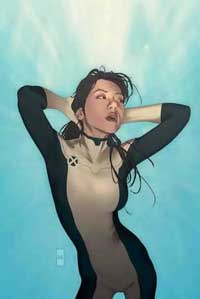 Although they'd already had a mini-series published by Oni Press in 2002, husband and wife writer team Nunzio DeFilippis & Christina Weir earned mainstream comic book attention when they became the writers of Marvel's Tsunami version of New Mutants. Their ability to get inside the lives of a group of teenagers suddenly having to deal with mutant powers and bigotry intrigued me. When I read the trade collection of their Oni comic Skinwalker, I was converted into a huge fan of their work. Because I think the couple is the next big thing, I thought they deserved a long interview about themselves and their work. Mr. Charlie agreed and we have our sixth column.
Although they'd already had a mini-series published by Oni Press in 2002, husband and wife writer team Nunzio DeFilippis & Christina Weir earned mainstream comic book attention when they became the writers of Marvel's Tsunami version of New Mutants. Their ability to get inside the lives of a group of teenagers suddenly having to deal with mutant powers and bigotry intrigued me. When I read the trade collection of their Oni comic Skinwalker, I was converted into a huge fan of their work. Because I think the couple is the next big thing, I thought they deserved a long interview about themselves and their work. Mr. Charlie agreed and we have our sixth column.
CBB: We can start with as little or as much biographical info as either of you want to share. Where were you born or where did you grow up? Any tidbits about your family or childhood you don't mind sharing.
ND: I was born in Flushing, New York (it's in Queens, part of the city but a bit more suburban in feel). I'm second generation on both sides. My dad is an Italian American immigrant who came to America in his teens. My mom is from the Dominican Republic and also came in her teens. I'm the middle of three boys, which I've been told by some makes perfect sense given my personality - but I've also been told it makes no sense given my personality, so I think people who try to associate certain personality types with order of birth are grasping at straws. I have a big family on both sides, forty plus cousins, and over two-dozen aunts and uncles. I grew up in Flushing and lived there my whole life until grad school, when I moved to L.A. I've stayed in L.A. since.
CW: I was born in New York City, lived in Connecticut briefly and then spent most of my teen years in Boston. I'm an only child with five brothers and sisters. Which is to say, both my parents were married previously and I have a brother on my mom's side and three brothers and a sister on my dad's. But I'm the only child of their marriage and the youngest, which I suppose makes me something of a pain in the ass from time to time. But now that I've grown up, my siblings seem to like me. I've pretty much known that I wanted to be a writer since I was five years old. But my early attempts at writing just make me cringe now.
ND: We both went to college at Vassar, in upstate New York. We met there and became friends. Then I went to Los Angeles for grad school at USC and she went back to Boston to go to grad school at Emerson. She then moved out to Los Angeles to pursue screenwriting and we became roommates. Several years later we started dating, soon afterwards we started writing together and three years ago we got married.
CBB: What kind of reading did either of you do as children and teens? If either of you read comics, what did you read?
CW: I didn't really read comics as a kid with the exception of occasional Archie comics. I only started reading comics about six years ago. I've had to make up for lost time. I read a lot of books as a kid though. I really liked the LITTLE HOUSE ON THE PRARIE books and a lot of Madeline L'Engle. After I read RING OF ENDLESS LIGHT I really wanted my own dolphin. I also loved the CHOOSE YOUR OWN ADVENTURE books. Those were cool!
ND: I read comics as a kid. I read the X-MEN, the Wolfman/Perez TITANS run, JUSTICE LEAGUE, some CAPTAIN AMERICA and SUPERMAN and BATMAN. I was a sucker for the 80s era DC books like BLUE BEETLE, BLUE DEVIL, BOOSTER GOLD and the humor based Justice League. Book-wise I would read pretty much anything science fiction and think it was good regardless of whether or not it was. I was a big fan of the CHRONICLES OF NARNIA. Though strangely (given everything else I'm listing) my favorite book then and now is OF MICE AND MEN.
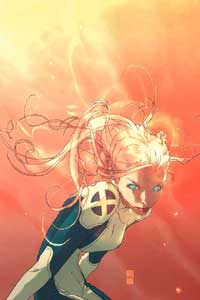 CBB: Did either of you write professionally before becoming a team?
CBB: Did either of you write professionally before becoming a team?
CW: We tried. But other than Nunzio doing an issue of DETECTIVE COMICS, all of our professional writing has been as a team.
CBB: How did you enter the screenwriting trade? Was it a goal, or was it one of those things where an opportunity presented itself when you really hadn't given much thought to writing for film and television?
ND: Definitely a goal. We both went to grad school for screenwriting, me for film and Christina for television. We hadn't thought of comics as a primary source of income or major career path until Greg Rucka suggested it.
CW: Our first big break came when I was working as a writer's assistant on HBO's ARLISS. I got along with the writers and showed them a spec script Nunzio and I had written. They liked it and gave us a shot at an episode. That went well and then they brought us on staff.
CBB: Christina, how did you become a writer's assistant and what were your duties?
CW: It was a strange convergence of events. I was temping at a video duplicating company and the owner of the company knew the producers and star of the show ARLISS. Then I ended up working at a literary agency for a day before they realized they didn't need the extra help. They felt so guilty that they helped me look for another job and one of the agents knew the writers' assistant who was leaving ARLISS. They got me an interview and having already met the producers, I snagged the job. As for my duties, I was both Writers Assistant and Script Coordinator. This meant that I assisted the writers in their meetings - took notes, etc. And when there were script changes, they gave them to me to put into the script. I was responsible for making sure updated pages got to the production office for distribution to all cast and crew. And I was also responsible for facilitating legal clearance issues - i.e. names made up for products or places or people have to be legally cleared to make sure such a thing doesn't already exist, or if it does that we can get permission to use it. As time went on and I developed
a better relationship with the writers I also got to give feedback and scripts and occasionally have some of my ideas incorporated in.
CBB: A question for both of you: I have read enough WRITER'S DIGEST issues to have a vague idea of how writing staffs work. Can you describe the experiences, the frustrations and rewards? What did you learn from the experience you can be sarcastic, of course? Was working like that a drag on your creativity?
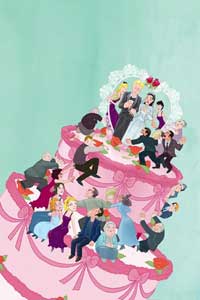 ND: I learned that thick skin is the key to success in writing. ROBERT WUHL was a harsh critic, and he liked to control every aspect of the show. He was also from the world of stand-up comedy, so when he went after your writing, he'd do it in witty ways that could humiliate you. After him, Bill Jemas' notes were easy to deal with!
ND: I learned that thick skin is the key to success in writing. ROBERT WUHL was a harsh critic, and he liked to control every aspect of the show. He was also from the world of stand-up comedy, so when he went after your writing, he'd do it in witty ways that could humiliate you. After him, Bill Jemas' notes were easy to deal with!
CW: Being on a writing staff can be a very fun or very painful experience. When we were in pre-production we would spend eight hours in a room together brainstorming and breaking down stories. These were the most tiring days. You can spend hours debating the most minute points. Then once production starts, it's like being on call. We had to be in bright and early in the morning in case any problems occurred while they were shooting. Since Robert also acted on the show, we'd have to wait for him to have breaks between scenes to discuss and future stories. So much of the day was spent hanging around the office waiting for ten minutes of time with Robert. But working on a television show is also cool because we could wander over to the set and watch them film or go to the art department and see set designs or wander down to editing and watch the final product be put together.
CBB: Did working on a TV show provide experiences that explain why TV is so bad? How much leeway are writers given to really be creative and inventive and tell good stories?
CW: Television is interesting. It should be this wonderfully collaborative medium. And when it is, you get the truly great TV shows that are out there. But sometimes the process doesn't work as it should. And you've got people above you laying down the law and not
making the most of the people they've hired to do their jobs. Leeway all depends on the people you're working for.
CBB: Since this has been an on going controversy for the last few years (at least in intensity), what did your colleagues and employers (from your perspective of course), think about the demands that production companies and studios hire more African-American/Black/Negro television writers?
ND: Honestly, they ignored it, like most people in Hollywood do. On Arliss, there was a buddy network in place, and most of Robert Wuhl's standup buddies were white. He hired people who thought like him and acted like him. We were there because of Christina's time as an assistant, and I don't think it even occurred to him that I (being half Dominican and half Italian) was the only "person of color" (and I use that term loosely as my color is not very dark at all) on the staff. It wasn't a racist thing, but it was a tough show to break in on, and I think a lot of shows were like that.
So how did it come up that the two of you should get into comics?
ND: Greg Rucka is the main reason we're in comics. He introduced me to Bob Schreck and Matt Idelson at DC, who gave me my first comic work - an issue of Detective Comics for the "Officer Down" crossover. After that, I was going to pursue comics solo as a side job, while Christina and I worked together on ARLISS and on feature film scripts. But we had the idea for SKINWALKER, and when we talked to Greg about it, he seemed to think it would be a good fit for Oni Press. They had published his WHITEOUT (and currently publish his QUEEN & COUNTRY), and we'd met the guys a couple of times. So we pitched SKINWALKER to them and that's how we wound up in comics. The thing is, those guys were so great to work with, we now think of ourselves as comic writers first. We tend to do our new story ideas as Oni books, then adapt to screenplay.
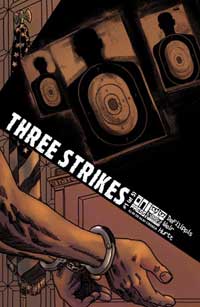 Once you were in, what was it like when you realized, OK, now we have to write something? Was there a lot of stumbling around? Did being professional screenwriters make it easy for you to be able to create and structure a comic book?
Once you were in, what was it like when you realized, OK, now we have to write something? Was there a lot of stumbling around? Did being professional screenwriters make it easy for you to be able to create and structure a comic book?
CW: It was a little difficult to get the hang of writing in the format. There's a different approach to storytelling in that you think in terms of pages. Where do you start the page? What do you want to end on? In a film script if your scene bleeds over onto another page, well who cares? However, being screenwriters I also think lent itself to working in comics. We're used to visual storytelling. And in many regards, being a comics writer gives you far greater control than screenwriting because you're acting as director as well as writer. You get to tell the "camera" exactly what the audience is looking at. At least, we do. We write very detailed scripts in terms of panel layouts. We got that from Greg who lent us some of his scripts so we could see how the formatting worked.
What were your early encounters with industry people like?
ND: The people I met at DC - Bob and Matt - were great. They were friendly and more than willing to give me a chance. But the Bat-Offices are hectic offices and sometimes I was struck by how long it took for things to happen in comics. Since then, I've discovered things move much quicker with Oni, and marginally quicker at Marvel. On the other hand, at Marvel, there was a lot of back and forth with Bill Jemas and Joe Quesada, who were very involved with setting the tone and pace of NEW MUTANTS. The guys at DC generally let me tell my story, and Oni is pretty hands-off. Jamie Rich and James Lucas Jones (our editors at Oni) tend to only intervene on a the actual story if they feel a serious mistake is being made.
Was SKINWALKER your first project or did you flirt with other ideas? Can you give us a short walk through of the creation of the Skinwalker from concept to publication - how did you contect with the artists? What was the structure of the collaboration or how much interplay (the give and take) was there between the creative parties?
CW: SKINWALKER was my first comics project. Nunzio and I had intended to write it as a feature, but Greg talked us into pursuing it as a comic. Since we were new to the comic world, we didn't really know any artists personally. Oni hooked us up with Brian Hurtt. We loved Brian immediately. He's very talented. But the funny thing was, at the time he was also fairly new and we got to watch him grow with every subsequent issue he did. When we were doing Skinwalker, we mostly wrote the scripts and Brian would call with occasional questions. But by the time we re finishing up, we'd gotten to know Brian a lot better. So there was a lot of interaction by the time we were doing "extras" for the trade paperback. And when Brian joined us on THREE STRIKES, we were writing in scenes he had asked for.
Did you seek out reviews to Skinwalker? Were you concerned with how your new colleagues would regard the work and was their feedback? Feel free to name drop.
ND: Oh boy do we seek out reviews. I'm particularly bad about it. Sometimes a bad review can roll right off me. But the minute I see multiple bad reviews, it's like I'm in high school again -- where the slightest criticism or mockery can bring your world crashing down. The tricky part is that browsing the Internet for reviews and responses, you can find the opinion of anyone with Internet access. And you find yourself alternating between treating them all like professional critics (which is foolish) and dismissing them all because they're not professional critics (which is elitist).
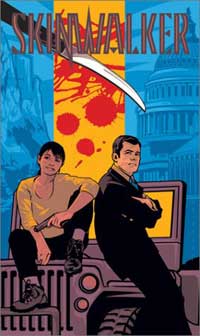 CW: It's very cool to get feedback from other professionals. Gail Simone has been very vocal in how much she enjoyed Skinwalker as was J. Torres. And that just makes your day when someone whose work you respect likes your stuff.
CW: It's very cool to get feedback from other professionals. Gail Simone has been very vocal in how much she enjoyed Skinwalker as was J. Torres. And that just makes your day when someone whose work you respect likes your stuff.
I think terms like backstory, prequel, and sequel are overused. I prefer to think of a story as a living thing, and what the reader gets to see is but a chapter in the life of that entity. Skinwalker seems to exists outside the story you shared with us, having a past and future. That adds depth to the story. That said, how much research and development did you have to invest in Skinwalker to make it so rich?
ND: Well, every story that comes out of something real (or cultural in this case) needs to have a certain amount of research. You have to put enough reality into it to make it slide into the real world. Yet you always have to remember you're writing fiction. And where reality and good story diverge, you have to choose good story. If you do it right, you don't have to make that choice very often. With Skinwalker we took a cultural subject that is very taboo to the Navajo. So there's only so much research you can do. And we realized the best way to do this without offending anyone was to make our killer something new. Nothing would be more insulting than to suggest that what our killer does happens every day in Navajo Country. As for the past and future, we come from the always-looking-to-edit world of TV, where the mantra is arrive late and leave early. So we try to do that in our stories. We try to make it seem as if the story has been going on before the reader arrives and that there may be a little more to explore after the reader
leaves.
How did New Mutants happen? Who approached whom?
CW: C.B. Cebulski approached us about New Mutants. We'd met him at San Diego and told him we'd be interested in working with Marvel. We had a Nightcrawler idea we wanted to pitch. Then apparently Bill Jemas had read Skinwalker and liked it. Since Dani was going to be a central character, Skinwalker turned out to be a good sample. I think we filled the smallest niche in comics - strong Native American women. C.B. asked if we'd like to do a proposal for the series. We did and the rest as they say is history.
You mentioned that Bill Jemas and Joe Quesada had a definite idea of what they wanted the series to be like. Were their ideas in sync, or did they differ slightly on what they wanted and how? Did they use catch phrases or high concepts to describe what they wanted and what were they? Did they reference manga, anime, or Hollywood and say something like, "We want this to be like Ghost meets The Manchurian Candidate?"
ND: They were definitely not Hollywood Joe and Bill throwing high concept X meets Y at us. But they had ideas and were not shy about sharing them. If we had one complaint, it wasn't their involvement. It was that the ideas they had kept changing. So we'd give them what we thought they had wanted, but suddenly what they wanted had changed. As for them being in sync, they had basically similar ideas, just different approaches in how to give us notes. No one mentioned manga to us as we developed it. We only heard about Tsunami from a reporter at Wizard. Boy were we confused when he asked us how this book was manga. We were left thinking "it is?" In retrospect, a lot of what they were asking for is typical of manga - a female focus, more attention to character even during the plot, new reader accessibility. So I guess they were going for a manga-esque feel but they never let us in on that.
Did you seek out reviews to Skinwalker? Were you concerned with how your new colleagues would regard the work and was their feedback? Feel free to name drop.
ND: Oh boy do we seek out reviews. I'm particularly bad about it. Sometimes a bad review can roll right off me. But the minute I see multiple bad reviews, it's like I'm in high school again -- where the slightest criticism or mockery can bring your world crashing down. The tricky part is that browsing the Internet for reviews and responses, you can find the opinion of anyone with Internet access. And you find yourself alternating between treating them all like professional critics (which is foolish) and dismissing them all because they're not professional critics (which is elitist).
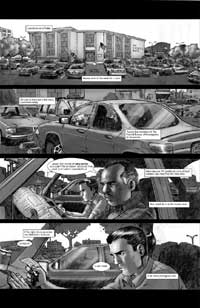 CW: It's very cool to get feedback from other professionals. Gail Simone has been very vocal in how much she enjoyed Skinwalker as was J. Torres. And that just makes your day when someone whose work you respect likes your stuff.
CW: It's very cool to get feedback from other professionals. Gail Simone has been very vocal in how much she enjoyed Skinwalker as was J. Torres. And that just makes your day when someone whose work you respect likes your stuff.
I think terms like backstory, prequel, and sequel are overused. I prefer to think of a story as a living thing, and what the reader gets to see is but a chapter in the life of that entity. Skinwalker seems to exists outside the story you shared with us, having a past and future. That adds depth to the story. That said, how much research and development did you have to invest in Skinwalker to make it so rich?
ND: Well, every story that comes out of something real (or cultural in this case) needs to have a certain amount of research. You have to put enough reality into it to make it slide into the real world. Yet you always have to remember you're writing fiction. And where reality and good story diverge, you have to choose good story. If you do it right, you don't have to make that choice very often. With Skinwalker we took a cultural subject that is very taboo to the Navajo. So there's only so much research you can do. And we realized the best way to do this without offending anyone was to make our killer something new. Nothing would be more insulting than to suggest that what our killer does happens every day in Navajo Country. As for the past and future, we come from the always-looking-to-edit world of TV, where the mantra is arrive late and leave early. So we try to do that in our stories. We try to make it seem as if the story has been going on before the reader arrives and that there may be a little more to explore after the reader
leaves.
How did New Mutants happen? Who approached whom?
CW: C.B. Cebulski approached us about New Mutants. We'd met him at San Diego and told him we'd be interested in working with Marvel. We had a Nightcrawler idea we wanted to pitch. Then apparently Bill Jemas had read Skinwalker and liked it. Since Dani was going to be a central character, Skinwalker turned out to be a good sample. I think we filled the smallest niche in comics - strong Native American women. C.B. asked if we'd like to do a proposal for the series. We did and the rest as they say is history.
You mentioned that Bill Jemas and Joe Quesada had a definite idea of what they wanted the series to be like. Were their ideas in sync, or did they differ slightly on what they wanted and how? Did they use catch phrases or high concepts to describe what they wanted and what were they? Did they reference manga, anime, or Hollywood and say something like, "We want this to be like Ghost meets The Manchurian Candidate?"
ND: They were definitely not Hollywood Joe and Bill throwing high concept X meets Y at us. But they had ideas and were not shy about sharing them. If we had one complaint, it wasn't their involvement. It was that the ideas they had kept changing. So we'd give them what we thought they had wanted, but suddenly what they wanted had changed. As for them being in sync, they had basically similar ideas, just different approaches in how to give us notes. No one mentioned manga to us as we developed it. We only heard about Tsunami from a reporter at Wizard. Boy were we confused when he asked us how this book was manga. We were left thinking "it is?" In retrospect, a lot of what they were asking for is typical of manga - a female focus, more attention to character even during the plot, new reader accessibility. So I guess they were going for a manga-esque feel but they never let us in on that.
1 2 3
Last Updated: November 29, 2025 - 16:51

 Although they'd already had a mini-series published by Oni Press in 2002, husband and wife writer team Nunzio DeFilippis & Christina Weir earned mainstream comic book attention when they became the writers of Marvel's Tsunami version of New Mutants. Their ability to get inside the lives of a group of teenagers suddenly having to deal with mutant powers and bigotry intrigued me. When I read the trade collection of their Oni comic Skinwalker, I was converted into a huge fan of their work. Because I think the couple is the next big thing, I thought they deserved a long interview about themselves and their work. Mr. Charlie agreed and we have our sixth column.
Although they'd already had a mini-series published by Oni Press in 2002, husband and wife writer team Nunzio DeFilippis & Christina Weir earned mainstream comic book attention when they became the writers of Marvel's Tsunami version of New Mutants. Their ability to get inside the lives of a group of teenagers suddenly having to deal with mutant powers and bigotry intrigued me. When I read the trade collection of their Oni comic Skinwalker, I was converted into a huge fan of their work. Because I think the couple is the next big thing, I thought they deserved a long interview about themselves and their work. Mr. Charlie agreed and we have our sixth column.
 CBB: Did either of you write professionally before becoming a team?
CBB: Did either of you write professionally before becoming a team?
 ND: I learned that thick skin is the key to success in writing. ROBERT WUHL was a harsh critic, and he liked to control every aspect of the show. He was also from the world of stand-up comedy, so when he went after your writing, he'd do it in witty ways that could humiliate you. After him, Bill Jemas' notes were easy to deal with!
ND: I learned that thick skin is the key to success in writing. ROBERT WUHL was a harsh critic, and he liked to control every aspect of the show. He was also from the world of stand-up comedy, so when he went after your writing, he'd do it in witty ways that could humiliate you. After him, Bill Jemas' notes were easy to deal with!
 Once you were in, what was it like when you realized, OK, now we have to write something? Was there a lot of stumbling around? Did being professional screenwriters make it easy for you to be able to create and structure a comic book?
Once you were in, what was it like when you realized, OK, now we have to write something? Was there a lot of stumbling around? Did being professional screenwriters make it easy for you to be able to create and structure a comic book?
 CW: It's very cool to get feedback from other professionals. Gail Simone has been very vocal in how much she enjoyed Skinwalker as was J. Torres. And that just makes your day when someone whose work you respect likes your stuff.
CW: It's very cool to get feedback from other professionals. Gail Simone has been very vocal in how much she enjoyed Skinwalker as was J. Torres. And that just makes your day when someone whose work you respect likes your stuff.
 CW: It's very cool to get feedback from other professionals. Gail Simone has been very vocal in how much she enjoyed Skinwalker as was J. Torres. And that just makes your day when someone whose work you respect likes your stuff.
CW: It's very cool to get feedback from other professionals. Gail Simone has been very vocal in how much she enjoyed Skinwalker as was J. Torres. And that just makes your day when someone whose work you respect likes your stuff.
